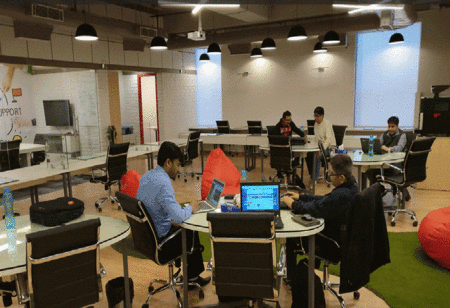
Co-Working Space Extends to Small Cities. How would this Benefit Businesses?


The nationwide lockdown has given opportunities for the companies to understand the pros and potential of work from home options. This scenario has forced some organizations to continue work from home, while some organizations find the new trend of working away from the office more beneficial. As it is cost-effective, yet employee productivity is commendable. Thus, few businesses have vacated their offices and opted out for work from home options temporarily. But, how would this impact the businesses, office, and co-working space? co-working gradually made its way into the business world as an alien. But, at a slow pace, it turned as a boon to the businesses especially the startups.
The basic idea of sharing the workspace has been readily embraced by the emerging small businesses and has become essential for the upcoming entrepreneurs and businesses. According to Statista, the growing popularity of co-working spaces has accounted for 1.5 million square feet in 2017 while it may elevate to ten million square feet by 2020.
After witnessing rapid growth in metropolitan cities, co-working spaces have begun their journey in the Tier-II and Tier-III. Co-working space has already gained traction in various cities such as Indore, Pune, Jaipur, and Ahmedabad. This move would have a positive impact on remote employment and collaborative working culture across the small cities. But, in the current situation where people prefer to work from their home to keep themselves as well as their near and dear ones away from this deadly infection.
Due to the rapid spread of COVID-19, the global coworking spaces market is expected to decline from $9.27 billion in 2019 and to $8.24 billion in 2020 at a CAGR of -12.9 percent says the report added to Researchandmarkets.com. Further, the report also states that the market may recover and reach $11.52 billion in 2023 at a CAGR of 11.8 percent.
Startup Evolution
According to NASSCOM reports, India's startup ecosystem has the potential to create nearly 12.5 lakh job opportunities by 2025, which is a good number in comparison with 3.9 to 4.3 lakh jobs in 2019. Unlike a decade ago, the country's youth prefer to reside away from the tedious metro cities which in turn has elevated the workspace opportunities in the Tier-II and III cities. Thus, the present combination of emerging entrepreneurs and co-working space has resulted in enhancing business operations across the small cities. Work Studio Coworking is one such company that is targetting to tax on tier-II cities such as Patna, Indore, and Ranchi. The company has received a decent number of enquires yet, pandemic effects are still on.
Co-working's Impression on Startup Ecosystem
The co-working space is very cost-effective and hence, startups, budding entrepreneurs, and freelancers opt for this affordable and easy access workspace.
Over a period of time, these work environments' impact on individual workers is clearly noticeable be it the amenities, branding, aesthetics, and other unique cultures that were created as a result of people from different communities and companies working together under one roof.
It is also observed that workers are benefited more in this co-working space as compared to the traditional offices. As it offers flexibility and most importantly wider exposure to learn new things and to build a network across the same and varied sectors that may help them in building their business.
Some of the benefits that co-working space assure are:
Conference Rooms and Meeting Rooms
Health Club and Fitness Center availability
Delivery and Mail sorting
Grab Food and Coffee on the go
High-Speed Wireless Internet Access and assistance
Co-working space also provides the power of time flexibility. As a person and work during the day and the very next day, he/she can choose to work at night. The potential of choosing when and where to work gives a comfort zone to the professional at his work front which would help them focus on their work with complete peace of mind that in turn would increase their overall productivity.
Future of Co-working Space
According to sources, about ten percent of office space in India is currently occupied by co-working spaces. And the number is also expected to rise by 25 percent in the next few years. Though co-working began its journey as just a freelancers movement it has now evolved into a viable real estate business now.
As the startup ecosystem emerging vastly, co-working space is becoming the first choice for these startups, particularly in the Indian market.